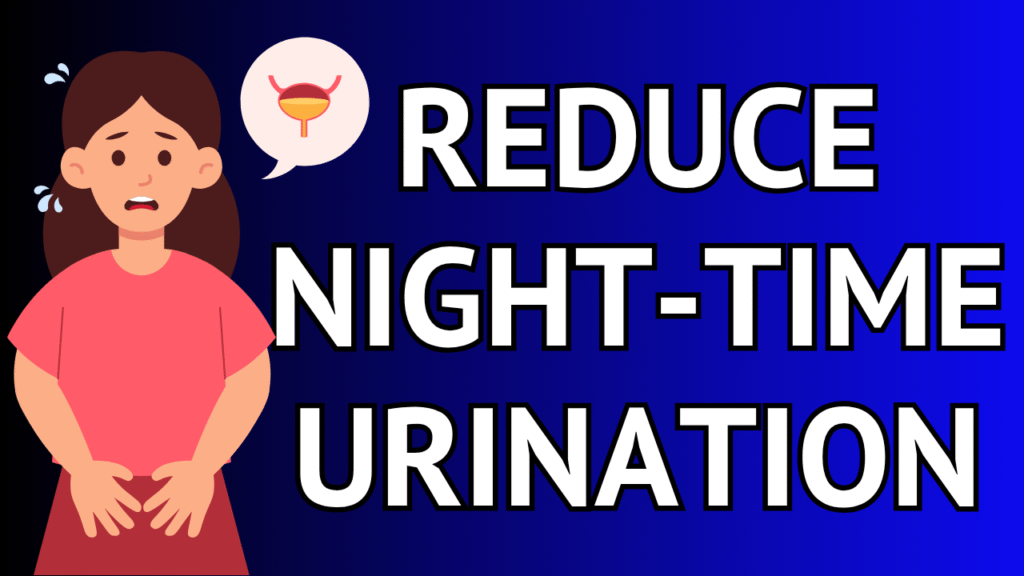
Frequent nighttime urination, known as nocturia, can disrupt your sleep, drain your energy, and impact your overall health, especially for older adults.
Waking up multiple times a night to use the bathroom is more than an inconvenience—it can affect your mood, productivity, and well-being. The good news? You can reduce nocturia naturally with science-backed strategies. In this article, we’ll explore 8 proven ways to manage nighttime urination, improve bladder control, and achieve restful sleep, optimized with SEO keywords for maximum discoverability. Don’t miss the often-overlooked tip #8—it could be a game-changer!
Understanding Nocturia and Its Impact
Nocturia is the need to urinate frequently at night, often caused by fluid retention, bladder irritation, medications, or conditions like enlarged prostate, diabetes, or weak pelvic muscles. It disrupts sleep quality, leading to fatigue, irritability, and reduced quality of life. By adopting these natural remedies, you can take control of your bladder health and enjoy uninterrupted sleep.
8 Proven Ways to Reduce Nighttime Urination
1. Limit Fluids Before Bed
Reducing fluid intake in the evening is a simple yet effective way to reduce nocturia.
- Why It Works: Prevents your bladder from filling overnight, minimizing nighttime trips to the bathroom.
- How to Do It: Avoid drinking 2–4 hours before bedtime, especially diuretics like coffee, tea, soda, and alcohol, which increase urine production. Sip small amounts of water if needed.
- Pro Tip: Focus on hydration during the day to avoid overloading at night for better bladder control.
2. Elevate Your Legs in the Evening
Fluid retention in the legs, common with swollen ankles, can increase urine production at night as fluid shifts into your bloodstream.
- Why It Works: Elevating legs helps your body reabsorb and eliminate excess fluid before bed.
- How to Do It: Raise your legs for 1–2 hours in the evening using pillows. Wear compression socks during the day to reduce swelling.
- Quick Tip: This is especially helpful for those with edema or prolonged sitting/standing.
3. Practice Double Voiding
Residual urine in the bladder can trigger frequent urges to urinate.
- Why It Works: Double voiding ensures your bladder is fully emptied, reducing nighttime urges.
- How to Do It: After urinating, wait a moment and try again to empty your bladder completely.
- Pro Tip: Ideal for those with enlarged prostate, weak pelvic muscles, or age-related bladder issues.
4. Avoid Bladder-Irritating Foods and Drinks
Certain foods and drinks irritate the bladder, increasing nocturia.
- Why It Works: Eliminating bladder irritants reduces urgency and improves nighttime bladder control.
- What to Avoid: Spicy foods, citrus fruits, tomatoes, chocolate, carbonated drinks, artificial sweeteners, and high-water-content foods like watermelon, grapes, or cucumbers in the evening.
- Quick Tip: Choose bladder-friendly foods like bananas or whole grains for dinner to support sleep quality.
5. Try Bladder Training
Bladder training increases your bladder’s capacity to hold more urine, reducing frequency and urgency.
- Why It Works: Strengthens bladder control over time, minimizing nighttime trips.
- How to Do It: Delay urination by 10–15 minutes, gradually increasing intervals between bathroom visits. Use a bladder diary to track progress and identify triggers.
- Pro Tip: Stay consistent to see improvements in bladder health.
6. Review Your Medications
Certain medications, like diuretics for high blood pressure or heart disease, can increase urine production at night.
- Why It Works: Adjusting the timing of diuretics can reduce nocturia.
- How to Do It: Ask your doctor about taking diuretics in the morning. Check if other meds, such as sleep aids, antidepressants, or blood sugar medications, contribute to nighttime urination.
- Pro Tip: Never adjust medications without consulting a healthcare provider.
7. Stay Active and Strengthen Your Pelvic Floor
Exercise and pelvic floor strength are key to managing nocturia.
- Why It Works: Daily movement reduces fluid retention, while pelvic floor exercises (Kegels) strengthen muscles that control urination, preventing leaks and urges.
- How to Do It: Engage in walking, yoga, or swimming, and practice Kegel exercises daily (10–15 reps, three times a day).
- Quick Tip: Kegels are especially effective for women and men with enlarged prostate.
8. Establish a Relaxing Bedtime Routine
Poor sleep hygiene can exacerbate nocturia and disrupt sleep quality.
- Why It Works: A relaxing bedtime routine boosts melatonin production, helping you fall and stay asleep longer, reducing nighttime awakenings.
- How to Do It: Try reading a book, light stretching, meditation, deep breathing, listening to calm music, or taking a warm bath. Avoid blue light from screens (smartphones, laptops, TVs) at least an hour before bed.
- Pro Tip: Create a screen-free evening ritual to enhance restful sleep.
Reclaim Your Sleep with Nocturia Relief
Frequent nighttime urination can take a toll on your health, mood, and energy levels, but these 8 proven strategies can help you regain control. From managing fluid intake and avoiding bladder irritants to practicing bladder training and strengthening your pelvic floor, each step brings you closer to uninterrupted sleep and improved well-being. Start with these natural remedies today to enjoy better bladder health and a restful night.
Which nocturia relief tip are you excited to try? Share your favorite sleep-improving strategies or experiences in the comments, and let’s inspire each other to sleep better!

